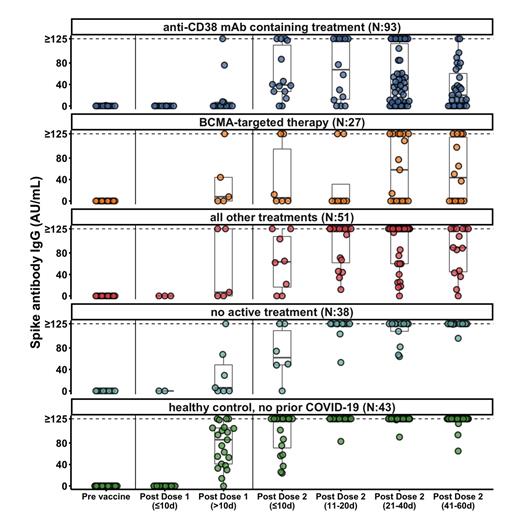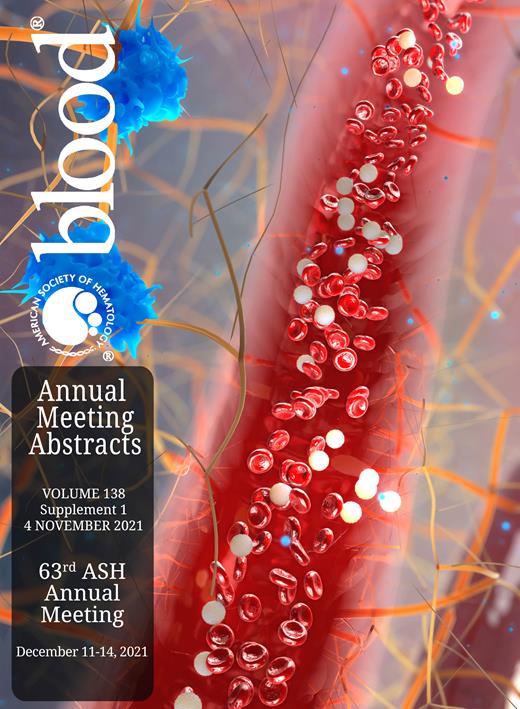Abstract
Background: Multiple myeloma (MM) patients are immunocompromised due to defects in humoral/cellular immunity and immunosuppressive therapy. Reports indicate that the antibody (Ab) response in MM after 1 dose of SARS-CoV-2 RNA vaccine is attenuated. The impact of treatment on cellular immunity after vaccination remains unknown.
Methods: We analyzed SARS-CoV-2 spike-binding (anti-S) IgG level in 320 MM patients receiving SARS-CoV-2 RNA vaccination. Blood and saliva were taken at multiple time points and compared with serology data of 69 age-matched vaccinated healthcare workers. We profiled SARS-CoV-2-specific T cell responses in a subset of 45 MM patients and 12 age-matched healthy controls by flow cytometry and ELIspot. All subjects were enrolled in studies approved by the Institutional Review Board at the Icahn School of Medicine at Mount Sinai.
Results: The 320 patients (median age 68 year) received two-dose RNA vaccines (69.1% BNT162b2, 27.2% mRNA-1273). Median time to diagnosis was 60 months with a median of 2 prior treatment lines (range 0-16). We included 23 patients with smoldering MM. Patients received various treatments at vaccination with 148 (43.8%) on anti-CD38-containing treatment, 36 (11.3%) on BCMA-targeted therapy and 59 (18.4%) not on active treatment (incl. SMM patients). At the last available evaluation prior to vaccination, 131 (40.9%) exhibited a complete response.
At data cutoff, a total of 260 patients (81.3%) had anti-S IgG measured >10 days after the second vaccine (median 51 days). Of these, 84.2% mounted measurable anti-S IgG levels (median 149 AU/mL). In the control group, Ab levels were significantly higher (median 300 AU/mL). Ab levels in the vaccinated MM patients with prior COVID-19 were 10-fold higher than those of patients without prior COVID-19 (p<0.001). Repeat Ab measurements up to 60 days after second vaccination confirm delayed and suboptimal IgG kinetics, particularly in patients receiving anti-MM treatment compared to controls (Figure 1).
MM patients on active treatment had lower anti-S IgG levels (p=0.004) compared to patients not on therapy (median 70 vs 183 AU/mL). Notably, 41 patients (15.8%) failed to develop detectable anti-S IgG: 24/41 (58.5%) were on anti-CD38, 13/41 (31.7%) on anti-BCMA bispecific Ab therapy and 4/41 (9.8%) >3 months after CAR T. Univariate analysis showed an association of disease-related factors with absence of anti-S IgG: more previous lines of treatment (>3 lines, p=0.035; >5 lines, p=0.009), receiving active MM treatment (p=0.005), grade 3 lymphopenia (p=0.018), receiving anti-CD38 therapy (p=0.042) and receiving BCMA-targeted therapy (p<0.001). Multivariate analysis (corrected for age, vaccine type, lines of treatment, time since diagnosis, response status and lymphopenia) confirmed that anti-CD38 (p=0.005) and BCMA-targeted treatment (p<0.001) are associated with not developing detectable anti-S IgG. Clinical relevance is emphasized by 10 cases of COVID-19 after 1 (n=7) or 2 vaccine doses (n=3, all without anti-S IgG) with 1 patient passing due to respiratory failure.
We studied SARS-CoV-2-specific T cell responses >2 weeks after the second vaccine in 18 MM patients with undetectable anti-S IgG (seronegative), 27 with detectable anti-S IgG (seropositive) and 12 healthy seropositive controls. We found that seropositive MM patients had CD4+CD154+ T cells producing IFNg, TNFa and IL-2 at similar levels as controls, whereas in the seronegative MM cohort CD4 T cell responses were significantly reduced (p<0.005). SARS-CoV-2-specific CD8 T cell responses were overall weaker and not different across cohorts. This data suggests that absence of detectable IgG is associated with suboptimal response of humoral and cellular immunity.
Conclusion: MM patients mount a suboptimal IgG response after SARS-CoV-2 vaccination, with 15.8% of patients without detectable anti-S IgG. Ongoing analyses will highlight durability of serological protection against COVID-19. Additional data on T cell responses and immunophenotyping in the context of vaccination will be updated at the meeting. Implications are continuation of non-pharmacological interventions, e.g. masking/social distancing, for vulnerable patients. The findings underscore a need for serological monitoring of MM patients after vaccination and for trials assessing use of prophylactic strategies or studies exploring additional immunization strategies.
Wang: Sanofi Genzyme: Consultancy. Chari: Karyopharm: Consultancy, Membership on an entity's Board of Directors or advisory committees; Seattle Genetics: Membership on an entity's Board of Directors or advisory committees, Research Funding; Millenium/Takeda: Consultancy, Research Funding; Sanofi Genzyme: Consultancy, Membership on an entity's Board of Directors or advisory committees; Genentech: Consultancy, Membership on an entity's Board of Directors or advisory committees; Pharmacyclics: Research Funding; GlaxoSmithKline: Consultancy, Membership on an entity's Board of Directors or advisory committees; Secura Bio: Consultancy, Membership on an entity's Board of Directors or advisory committees; Amgen: Consultancy, Membership on an entity's Board of Directors or advisory committees, Research Funding; Antengene: Consultancy, Membership on an entity's Board of Directors or advisory committees; Oncopeptides: Consultancy, Membership on an entity's Board of Directors or advisory committees; Novartis: Consultancy, Research Funding; Janssen Oncology: Consultancy, Membership on an entity's Board of Directors or advisory committees, Research Funding; Shattuck Labs: Consultancy, Membership on an entity's Board of Directors or advisory committees; BMS/Celgene: Consultancy, Membership on an entity's Board of Directors or advisory committees, Research Funding; Takeda: Consultancy, Research Funding; AbbVie: Consultancy, Membership on an entity's Board of Directors or advisory committees. Cordon-Cardo: Kantaro: Patents & Royalties. Krammer: Kantaro: Patents & Royalties; Merck: Consultancy; Pfizer: Consultancy; Avimex: Consultancy; Seqirus: Consultancy. Jagannath: Legend Biotech: Consultancy; Karyopharm Therapeutics: Consultancy; Janssen Pharmaceuticals: Consultancy; Bristol Myers Squibb: Consultancy; Sanofi: Consultancy; Takeda: Consultancy. Simon: Kantaro: Patents & Royalties. Parekh: Foundation Medicine Inc: Consultancy; Amgen: Research Funding; PFIZER: Research Funding; CELGENE: Research Funding; Karyopharm Inv: Research Funding.


